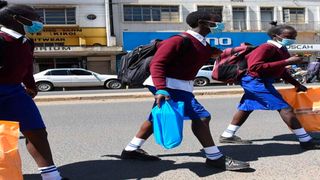
Students head for the bus terminus in Eldoret, Uasin Gishu County, on March 16, 2021 to board matatus back home after schools closed for a two-month second term recess.
| Jared Nyataya | Nation Media GroupEducation
Premium
Headache for parents as schools demand fees
As the first term of 2021 comes to an end this week, parents are feeling the pressure of having to pay school fees after just two months.
With learners in primary and secondary schools closing for a one-week holiday, parents must pay fees on October 10, the fourth time they will be doing so this year.
Already reeling under a harsh economy, many parents who spoke to the Nation yesterday said they would struggle to raise money when learners go back to school.
“It’s particularly difficult for parents whose children are in Form One. We paid fees for a full term just last month. Some of the learners have been at school for hardly a month,” Mr Stephen Mwangi, a parent from Murang’a County, said.
The school calendar was reorganised to make for time lost last year during the long closure occasioned by the outbreak of the Covid-19 pandemic.
However, parents are now feeling the pinch of the crash programme that will have four school terms up to the end of next year.
Their situation has been worsened by the effect the pandemic has had on the economy.
Many parents lost their jobs while those in businesses saw their incomes tumble.
“The prices of almost everything have gone up but for most parents, we are earning less. We appeal to principals not to send away children for not paying school fees,” Ms Maggie Mutisya, a parent from Nairobi, said.
Public schools
When schools opened in the last week of July for first term, many parents complained that they were struggling to raise fees amidst accusations that school heads were charging levies outside the guidelines issued by the Education ministry.
Although the government supports the education of learners in public schools through the free primary and free-day secondary programmes, parents shoulder the burden of boarding fees and meals.
Parents meet other costs for personal effects, transport and uniform.
Yesterday, the national chair of the parent’s association Nicholas Maiyo pleaded with head teachers to stick to the fees guidelines issued by the ministry.
He warned that parents will report those who flout the guidelines to the Ethics and Anti-Corruption Commission (EACC).
“We are going through challenges but parents don’t have an issue with paying the stipulated fees. However, some schools demand levies for remedial teaching and motivation that are quite high. We call upon the government to take action against such head teachers and principals,” he said.
EACC has already written to the ministry asking for a list of head teachers who have flouted fees guidelines for action.
In effect, Basic Education Principal Secretary Julius Jwan, in a circular, instructed county and regional directors of education to investigate reported cases and forward the same to the ministry.
The Nation understands that the Teachers Service Commission is also investigating a number of principals. At least one principal has since been interdicted. In an attempt to lessen the parents’ burden, the ministry reduced the fees for secondary schools since the academic year will take 30 weeks instead of the usual 39.
Fees for national schools were slashed by Sh8,500 while those for extra-county schools went down by Sh5,500
National schools
Parents with children in national schools will pay Sh45,000 while those in extra-county schools will pay Sh35,000 for the year. The capitation for learners in both boarding and day schools is Sh22, 244.
However, at times the funds are disbursed late, thereby causing distress in schools.
Schools, for instance, are yet to receive the capitation funds for Form Ones since they had not been entered into the National Educational Management Information System.
Learners in day secondary schools and primary schools are not expected to pay fees. However, the boards of management, working with the parents’ association, can set a fee for lunch, for which they are required to seek approval from the ministry.
The long closure last year forced some private schools to shut down or change their businesses.
The chief executive of the Kenya Private Schools Association Peter Ndoro told the Nation that private schools are still in financial distress and that parents are also struggling paying fees.
Mr Ndoro said they are encouraging the schools to agree with parents on how to pay school fees.
He disclosed that the association had struck a deal on a credit facility with Equity Bank and Kenya Commercial Bank.
Under the arrangement, interested parents will apply to the banks so that they pay the full term fees to the schools and then the parents pay the banks in instalments.
Last year, President Uhuru Kenyatta had promised a Sh7 billion stimulus package for private schools. However, Mr Ndoro said the money has never been released. “We appeal to the government to make the money available,” he pleaded.





